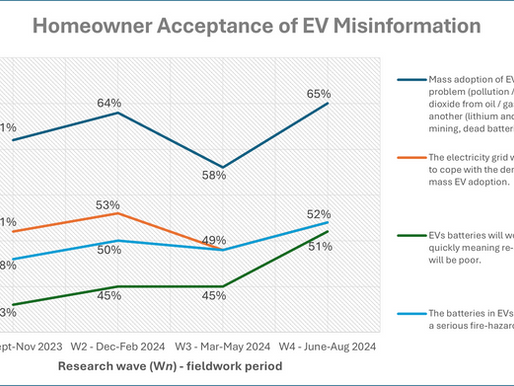A persistent false narrative suggesting that electric vehicle (EV) sales are stalling, is leading manufacturers like Vauxhall and Nissan to pressure the government to relax its Zero Emission Vehicle (ZEV) Mandate, according to our Homeowner Electrification Tracker Study (HETS).
Widespread misinformation about EVs has fostered confusion and scepticism, undermining consumer confidence and slowing the transition to mass adoption.
While, UK EV sales continue to rise year-on-year—with November 2024 marking a significant surge in registrations—the overall growth remains slower than anticipated, putting the UK’s Net Zero targets at risk.

The missing link: consumer psychology and market research
Consumers are ready for change
-
Purchase intent is rising: Over the past 18 months, the proportion of potential car buyers planning to purchase an EV rose four percentage points to 27%.
-
Declining infrastructure concerns: Those citing charging infrastructure as a barrier dropped from 17% in July 2023 to just 7% in July 2024. (This seems in line with the reality on the ground. Zap Map report the number of public chargers in the UK grew from 54,000 at the end of 2023 to more than 70,000 by Nov. 2024).
-
Cost priorities: 61% of car buyers prioritize saving money on fuel, aligning with EVs’ lower running costs.
-
Environmental awareness: Nearly half (48%) of homeowners recognize EVs’ positive environmental impact, while 78% express deep concerns about climate change.However, upfront costs remain a significant concern for 41% of homeowners.
While EV prices are falling—especially in the second-hand market—the larger threat is a growing acceptance of misinformation.
Misinformation epidemic: four myths fuelling consumer doubt
HETS findings show there are four pervasive myths undermining consumer confidence:
-
The environmental trade-off myth[i]:
-
65% believe mining and battery disposal negate EVs’ benefits (up from 61% last year).
-
Fact: EVs achieve carbon payback in two years, with newer LFP batteries significantly reducing reliance on cobalt[ii].
-
-
The grid strain myth[iii]:
-
52% think the electricity grid cannot handle widespread EV adoption.
-
Fact: Studies show the grid is prepared, with smart charging solutions easing peak demand[iv].
-
-
The fire risk myth[v]:
-
52% view EVs as fire hazards (up from 48%).
-
Fact: EVs are less prone to fires than petrol vehicles.
-
-
The battery longevity myth[vi]:
-
51% believe EV batteries degrade too quickly (up from 43%).
-
Fact: EV batteries lose just 2% capacity annually, retaining 90% after five years.
-
“These myths persist despite evidence proving EVs are greener, safer, and more cost-effective than petrol cars,” says Marks. “The psychological impact of misinformation is stalling momentum and eroding trust in the market.”
Breaking the Stalemate
The stakes are too high to let misinformation hinder progress. Electrify Research argues that addressing these myths through public awareness campaigns and leveraging actionable insights from tools like HETS are essential to improving consumer confidence and accelerating adoption.
“Market research has been sorely missing from this debate,” adds Marks. “Our data provides a clear roadmap for understanding consumer psychology and breaking through the uncertainty surrounding EV adoption.”
END
About Electrify Research and HETS
The Homeowner Electrification Tracker Study (HETS) by Electrify Research monitors homeowner attitudes and adoption of EVs, heat pumps, solar panels, and home batteries—key technologies for decarbonizing homes. Launched in May 2023, HETS conducts over 16,000 interviews annually across the UK, France, Germany, and the US. In addition to its robust quantitative insights, HETS collects and analyses more than 250,000 open-ended comments each year to uncover the true ‘top of mind’ issues for homeowners. Each wave of research uses country-representative samples, ensuring the findings are both accurate and actionable.
HETS is available on subscription, offering an interactive insight dashboard that provides full access to its findings. It empowers organizations—such as energy providers, banks offering sustainable finance solutions, governments, manufacturers, installers, pressure groups, and lobbyists—to make smarter decisions and accelerate the electrification of homes.
Electrify Research was founded by Ben Marks in May 2023 to deliver powerful insights into home electrification. With over two decades of experience, Ben has dedicated his career to bringing market research to industries traditionally less reliant on it. At YouthSight, the leading youth research agency he founded in 2004, Ben pioneered the use of market research in higher education and youth markets, helping universities understand and improve student outcomes through the “HE Success Suite” of tracker surveys. YouthSight was sold to Savanta Research in 2022, where its work continues today.
Media Contact
Ben Marks
Managing Director, Electrify Research
Email: ben.marks@electrifyresearch.co.uk
Website: www.electrifyresearch.co.uk
End notes
[i] "Mass adoption of EVs swaps one problem (pollution / carbon dioxide from oil / gas) with another (lithium and cobalt mining, dead batteries)."
[ii] The carbon "pay-back" period for EVs typically ranges from 6 months to 4 years, depending on renewables intensity on the grid and battery size. Newer battery chemistries, such as lithium iron phosphate (LFP) (increasingly adopted in Chinese vehicles) eliminate the use of cobalt.
[iii] "The electricity grid won’t be able to cope with the demands of mass EV adoption"
[iv] The UK's electricity grid is well-equipped to handle the growing demand from EVs, especially with smart charging solutions. Even a complete switch to EVs would increase demand by only about 10%, staying within manageable limits. Smart charging optimizes grid use by shifting charging to off-peak times and integrating more renewable energy.
[v] "The batteries in EVs makes them a serious fire-hazard"
[vi] "EVs batteries will wear out too quickly meaning resale values will be poor"
.png)




Leave a Comment